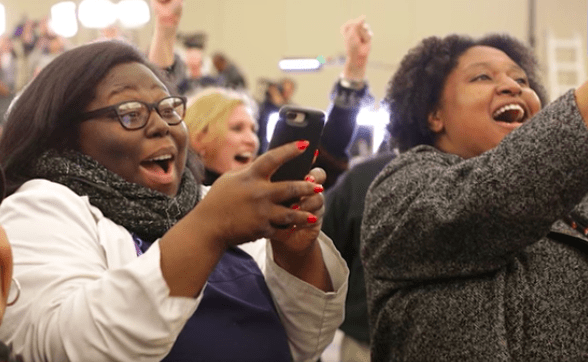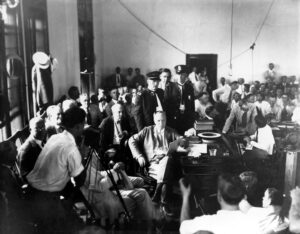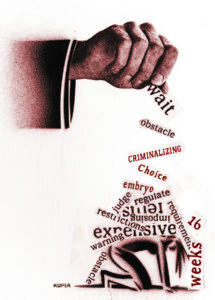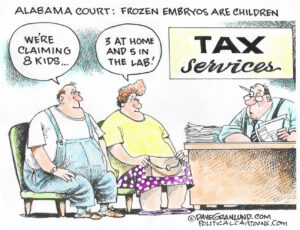Black Women Running for Office in Record Numbers in Alabama
After propelling Democrat Doug Jones all the way to the Senate, it’s their time to shine. Alabama voters cheer after Doug Jones defeats Roy Moore. (Screenshot / YouTube)
Alabama voters cheer after Doug Jones defeats Roy Moore. (Screenshot / YouTube)
In December 2017, for the first time in 25 years, Alabama voters elected a Democrat to the Senate. Doug Jones defeated Republican Roy Moore to fill the Senate seat vacated by Attorney General Jeff Sessions. As NBC News reported, Jones won largely thanks to the support of 96 percent of black voters and, notably, 98 percent of black women. Black women changed the course of Alabama politics, but they were just getting started. Now, black women are running for office across the state.
As Glamour reported this week, “An unprecedented groundswell of at least 70 black women have launched electoral campaigns across Alabama for local, state, and national offices in 2018.”
NBC puts that number lower, at three dozen, but also used the word “unprecedented” to describe the situation.
Many of the women are first-time candidates like Jameria Moore, an attorney who is running for a judgeship. “It’s so important that we step up, that we show the nation that we can lead,” Moore told NBC. Organizers and local officials said the candidacies are “evidence of a small but significant Democratic burst of political activism that could put a blue-hued dent in a deep-Trump state.”
Other observers say that this surge of energy isn’t an aberration. As Dr. Wendy Smooth, a political scientist at Ohio State University, told Glamour: “Once women learn [how to] get a candidate elected into office, a lightbulb comes on and they say, ‘This isn’t that hard after all. I too can do this.’ ”
Rhonda Briggins, a co-founder of RunVoteLead and an Alabama native, agreed, telling Glamour, “Women are primarily the workers behind the Alabama New South Coalition and Alabama Democratic Conference, organizations that, since the civil rights movement, have become the foundation of black political power in Alabama.”
Electing Jones to office made many of these women realize they could not only support candidates, they could be candidates. “After so many black women carried Doug Jones over the threshold, I think more women across the state began to see our political power,” Ashley Smith, 34, who is running for district judge, told the magazine.
All that campaigning has been good training. “We know we can do these jobs because we’ve been behind the scenes, whether it is assisting someone in doing the job, or doing it and not getting the recognition,” Marshell Jackson Hatcher, 51, a lawyer running for Jefferson County circuit court judge, said.
These women are well qualified, but the lingering question is whether they’ll be able to break down the doors of the old, white boys’ clubs and get access to the same kinds of resources white candidates do. Smooth cautions that voters and observers alike should “pay attention to how many of them are formally endorsed, [which is a sign of] their parties’ support and belief that these candidates are viable.” Unfortunately, “In surveys, women of color report that when they first ran for office, they received less party support than they’d hoped, or were even discouraged from running.”
Still, the candidates remain undaunted, taking inspiration from the late Shirley Chisholm, the first black woman elected to Congress as well as the first black presidential candidate. As Chisholm once said, “If they don’t give you a seat at the table, bring a folding chair.”
Your support matters…
Independent journalism is under threat and overshadowed by heavily funded mainstream media.
You can help level the playing field. Become a member.
Your tax-deductible contribution keeps us digging beneath the headlines to give you thought-provoking, investigative reporting and analysis that unearths what's really happening- without compromise.
Give today to support our courageous, independent journalists.








You need to be a supporter to comment.
There are currently no responses to this article.
Be the first to respond.